

Claudius. Fourth Emperor of Ancient Rome Augustus Claudius's infirmity probably saved him from the fate of many other nobles during the purges of Tiberius' and Caligula's reigns; potential enemies did not see him as a serious threat.
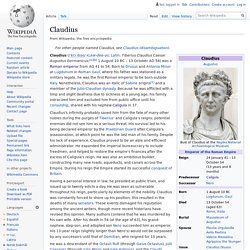
His survival led to his being declared emperor by the Praetorian Guard after Caligula's assassination, at which point he was the last man of his family. Despite his lack of experience, Claudius proved to be an able and efficient administrator. He expanded the imperial bureaucracy to include freedmen, and helped to restore the empire's finances after the excess of Caligula's reign. Having a personal interest in law, he presided at public trials, and issued up to twenty edicts a day. Family and early life[edit] Claudius was born on 1 August 10 BC at Lugdunum (modern Lyon, France). In 9 BC, his father Drusus unexpectedly died on campaign in Germania, possibly from illness. Julius Caesar. Roman general and dictator Gaius Julius Caesar[a] ( SEE-zər, Latin: [ˈɡaːi.ʊs ˈjuːli.ʊs ˈkae̯.sar]; 12 July 100 BC – 15 March 44 BC) was a Roman general and statesman who played a critical role in the events that led to the demise of the Roman Republic and the rise of the Roman Empire.
In 60 BC, Caesar, Crassus and Pompey formed the First Triumvirate, a political alliance that dominated Roman politics for several years. Their attempts to amass power as Populares were opposed by the Optimates within the Roman Senate, among them Cato the Younger with the frequent support of Cicero. Caesar rose to become one of the most powerful politicians in the Roman Republic through a string of military victories in the Gallic Wars, completed by 51 BC, which greatly extended Roman territory. During this time he both invaded Britain and built a bridge across the Rhine river. En.m.wikipedia.
A philippic (/fɪˈlɪpɪk/)[1] is a fiery, damning speech, or tirade, delivered to condemn a particular political actor.

The term is most famously associated with two noted orators of the ancient world, the Roman Cicero and, most significantly, Demosthenes of Athens in his movement against the imperialist ambitions of Philip of Macedon. Demosthenes speeches, in 351 BC, denouncing the leader later became known as "The Philippics". En.m.wikipedia. Basileus of Macedon Biography.
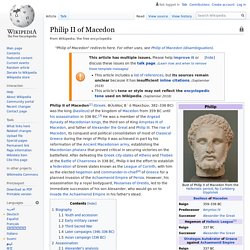
En.m.wikipedia. First emperor of the Roman Empire Princeps Civitatis After the demise of the Second Triumvirate, Augustus restored the outward façade of the free Republic, with governmental power vested in the Roman Senate, the executive magistrates, and the legislative assemblies.
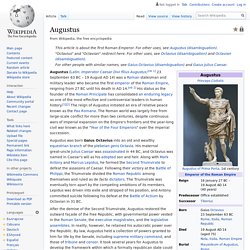
En.m.wikipedia. Ancient Athenian statesman and orator Early years and personal life[edit] Family and personal life[edit] Bust of Demosthenes (British Museum, London), Roman copy of a Greek original sculpted by Polyeuktos.
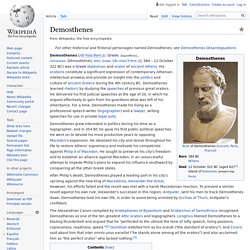
En.m.wikipedia. Roman politician and general Marcus Antonius[note 1] (14 January 83 BC – 1 August 30 BC), commonly known in English as Mark Antony or Anthony, was a Roman politician and general who played a critical role in the transformation of the Roman Republic from an oligarchy into the autocratic Roman Empire.
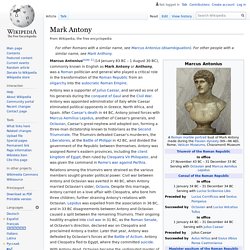
Early life[edit] Antony's brother Lucius, on a coin issued at Ephesus during his consulship in 41 BC. Gr220en. Sulla. Ancient Roman general, consul and dictator Sulla's military coup—ironically enabled by Marius' military reforms that bound the army's loyalty with the general rather than to the Republic—permanently destabilized the Roman power structure.
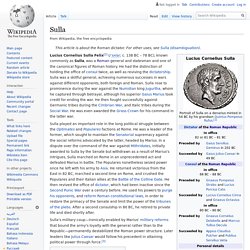
Later leaders like Julius Caesar would follow his precedent in attaining political power through force.[3] Sources[edit] Sulla's life was habitually included in the ancient biographical collections of leading generals and politicians, originating in the biographical compendium of famous Romans published by Marcus Terentius Varro. Cicero. 1st-century BC Roman lawyer, orator, philosopher and statesman Marcus Tullius Cicero[n 1] ( SISS-ə-roh, Classical Latin: [ˈmaːrkʊs ˈtʊllɪ.ʊs ˈkɪkɛroː]; 3 January 106 BC – 7 December 43 BC)[2] was a Roman statesman, orator, lawyer and philosopher, who served as consul in the year 63 BC.
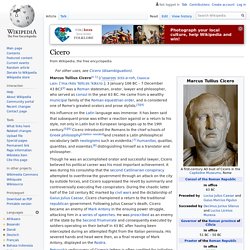
He came from a wealthy municipal family of the Roman equestrian order, and is considered one of Rome's greatest orators and prose stylists.[3][4] His influence on the Latin language was immense: it has been said that subsequent prose was either a reaction against or a return to his style, not only in Latin but in European languages up to the 19th century.[5][6] Cicero introduced the Romans to the chief schools of Greek philosophy[citation needed]and created a Latin philosophical vocabulary (with neologisms such as evidentia,[7] humanitas, qualitas, quantitas, and essentia),[8] distinguishing himself as a translator and philosopher. Hellenistic philosophy. Hellenistic philosophy is the period of Western philosophy and Middle Eastern philosophy that was developed in the Hellenistic period following Aristotle and ending with the beginning of Neoplatonism.
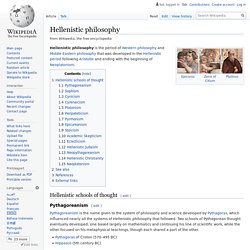
Hellenistic schools of thought[edit] Pythagoreanism[edit] Pythagoreanism is the name given to the system of philosophy and science developed by Pythagoras, which influenced nearly all the systems of Hellenistic philosophy that followed. Tullia. It may also refer to : Places and jurisdictions Tullia, Numidia, formerly an Ancient Roman town and diocese in Numidia, presently in Algeria and a Latin Catholic titular see Female given name.

Translation. King Charles V the Wise commissions a translation of Aristotle. First square shows him ordering the translation; second square, the translation being made. Third and fourth squares show the finished translation being brought to, and then presented to, the King. A translator always risks inadvertently introducing source-language words, grammar, or syntax into the target-language rendering.
On the other hand, such "spill-overs" have sometimes imported useful source-language calques and loanwords that have enriched target languages. Translators, including early translators of sacred texts, have helped shape the very languages into which they have translated.[2] Titus Pomponius Atticus. Close friends since childhood, Cicero dedicated his work, Laelius de Amicitia (Latin for Treatises on Friendship), to Atticus. Their correspondence, often written in subtle code to disguise their political observations, is preserved in Epistulae ad Atticum (Letters to Atticus) compiled by Tiro, Cicero's slave (later his freedman) and personal secretary.
Tempest in a teapot. Tempest in a teapot (American English), or storm in a teacup (British English), is an idiom meaning a small event that has been exaggerated out of proportion. There are also lesser known or earlier variants, such as tempest in a teacup, storm in a cream bowl, tempest in a glass of water, storm in a wash-hand basin,[1] and storm in a glass of water. Etymology[edit] The first recorded instance of the British English version, "storm in teacup", occurs in Catherine Sinclair's Modern Accomplishments in 1838.[8][9] There are several instances though of earlier British use of the similar phrase "storm in a wash-hand basin".[10] Servius Sulpicius Rufus. Servius Sulpicius Rufus (c. 106 BC – 43 BC), was a Roman orator and jurist and the father of the poet Sulpicia, the only Roman female poet whose poetry survives. He was consul in 51 BC.[1] Biography[edit] Early life[edit] He studied rhetoric with Cicero, accompanying him to Rhodes in 78 BC, though Sulpicius decided subsequently to pursue legal studies.
Quintus Tullius Cicero. Otium. O tempora o mores! Marius Nizolius. Marius Nizolius (Italian: Mario Nizolio; 1498–1576) was an Italian humanist scholar, known as a proponent of Cicero. He considered rhetoric to be the central intellectual discipline, slighting other aspects of the philosophical tradition.[1][2] He is described by Michael R. Marcus Tullius Tiro. Marcantonius Majoragio. Marcantonius Majoragio (1514–1555[1]) was a Christian within Italy during the Renaissance period.[2][3][1] Lorem ipsum. List of ancient Romans. Wikimedia list article. Ipse dixit. Esse quam videri. Esse quam videri is a Latin phrase meaning "To be, rather than to seem". E pluribus unum. Clausula. Civis romanus sum. Caecilia Metella.
Pomponia Caecilia Attica. A Dialogue Concerning Oratorical Partitions. The Unquiet Dead. Charles Dickens. Simon Callow. Fifth Doctor. Peter Davison. Doctor Who – Main Range. Doctor Who. Scott Handcock. David Llewellyn. Samuel Barnett. SPQR series. John Maddox Roberts. Steven Saylor. Roma Sub Rosa. Dictator.
Lustrum. Imperium. Robert Harris. Taylor Caldwell. Julius Caesar. Colleen McCullough. Masters of Rome. Rome. David Bamber. List of Rome characters. Julius Caesar. André Morell. Cleopatra. Michael Hordern. Julius Caesar. Alan Napier. Julius Caesar. William Shakespeare. Catiline His Conspiracy. Second Catilinarian conspiracy. Ben Jonson. Julio-Claudian dynasty. Roman Forum.
Palatine Hill. Pompeii. Opus quadratum. Ferdinand II of the Two Sicilies. Nymphaeum. De Legibus. De re publica. Bogomilism. Chalcedonian Christianity. Virtuous pagan. Writings of Cicero. Hicetas. Nicolaus Copernicus. Michael Parenti. Friedrich Engels. James Powell. Camille Desmoulins. John Adams. French Revolution. Founding Fathers of the United States. Claude Prosper Jolyot de Crébillon. Second Catilinarian conspiracy. Montesquieu. David Hume. Denis Diderot. Edward Gibbon. Philosophes. Gutenberg Bible. De Officiis. John Locke.